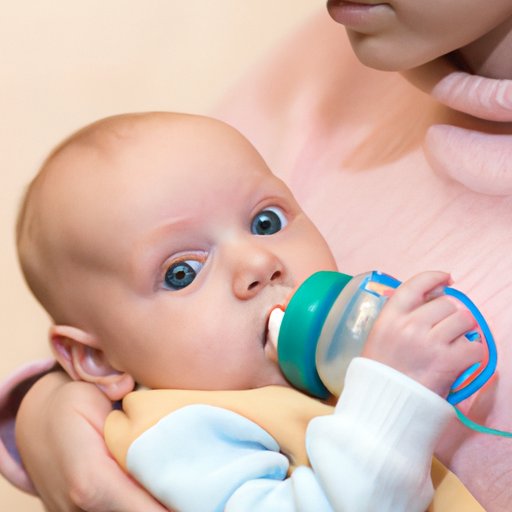
Introduction
As new parents, one of the most common concerns you may experience is around your baby’s weight loss. It’s natural to want to ensure your little one is healthy, happy, and thriving. However, weight loss after birth is a normal and expected occurrence, and it’s essential to understand what is typical and what is not.
The Truth Behind Baby Weight Loss: Understanding the Normal Patterns and Causes
Baby weight loss typically occurs in the first days and weeks after birth and is a natural part of healthy development. There are several reasons why a baby may lose weight, including:
- Loss of excess fluid: Your baby is born with excess fluid in their body, which they will naturally lose in the first few days after birth through urination, bowel movements, and breathing.
- Delayed breastfeeding: Breastfeeding may take some time to establish, and some babies may find it difficult to latch or suckle initially. This can result in a delay in milk production and decreased caloric intake for the baby.
- Formula feeding: Babies who are formula-fed may also experience weight loss due to the adjustment their bodies need to make to adapt to the new type of milk.
- Metabolic changes: As the baby adjusts to life outside the womb, they may experience metabolic changes that can also contribute to weight loss.
It’s important to note that weight loss should not occur for more than the first few weeks of life, and it should not be excessive. If you are concerned about your baby’s weight loss, speak to your pediatrician.
What to Expect: A Guide to Baby Weight Loss in the First Weeks of Life
On average, babies will lose around 5-10% of their birth weight in the first few days after birth. This weight loss is generally due to the factors mentioned above, and it should be regained by the time the baby is about two weeks old.
However, it’s important to recognize that every baby is different, and weight loss can vary. If a baby loses more than 10% of their birth weight, or if they continue to lose weight beyond the first few weeks, it may indicate a problem and require medical attention.
Do Babies Really Lose Weight After Birth? Debunking Myths and Exploring the Facts
There are several common myths surrounding baby weight loss that are not true. For example:
- “Breastfed babies don’t lose weight.” Breastfeeding is a natural process, but it can take time for a baby to learn how to latch and suckle correctly. While breastmilk is packed with essential nutrients and calories, some babies may still lose weight initially, especially if they’re not breastfeeding frequently enough.
- “Formula-fed babies don’t lose weight.” While formula can provide the necessary calories and nutrients, formula-fed babies can still experience weight loss due to the adjustment their bodies need to make to adapt to this new type of milk.
It’s essential to remember that all babies are unique and will have different experiences with weight loss. The scientific evidence shows that weight loss in newborns is normal, and it’s only a concern if it persists for more than a few weeks or is excessive.
Managing Newborn Weight Loss: Tips and Strategies for Parents
While newborn weight loss is normal, there are several ways parents can help their little ones regain their birth weight:
- Feed frequently: Whether you’re breastfeeding or formula-feeding, offer your baby plenty of opportunities to eat. Newborns often need to eat every 2-3 hours, and some may need to eat even more frequently.
- Feed on demand: Pay attention to your baby’s hunger cues and feed them when they show signs of hunger, such as rooting, sucking on their fists, or making smacking noises.
- Seek support: If you’re struggling with breastfeeding, seek out support from a lactation consultant or breastfeeding support group. They can provide tips and advice to help you establish a successful nursing relationship.
- Use paced bottle feeding: If you’re formula-feeding, try paced bottle feeding to mimic the natural rhythm of breastfeeding and help your baby avoid overeating.
When to Worry About Baby Weight Loss: Signs to Look Out For
While weight loss is a natural part of newborn development, there are some signs that weight loss may be a concern:
- No weight gain: If your baby continues to lose weight beyond the first few weeks or does not regain their birth weight by the time they’re two weeks old, it may indicate a problem.
- Dehydration: Signs of dehydration include decreased urination, dark urine, dry or cracked lips, and no tears when crying.
- Jaundice: While jaundice is normal in many newborns, it may indicate a problem if it’s severe or persists beyond the first few weeks of life.
- Poor feeding: If your baby is not interested in feeding or seems lethargic or unresponsive, it may indicate a problem.
If you notice any of these signs, it’s essential to speak to your pediatrician as soon as possible.
Conclusion
While weight loss after birth can be a concern for new parents, it’s essential to remember that it’s a normal part of newborn development. Understanding the typical patterns of weight loss and knowing when to seek help is essential to ensure your baby is healthy, happy, and thriving.
By following the tips and strategies outlined in this article, you can help your baby regain their birth weight and navigate the ups and downs of new parenthood with confidence.




